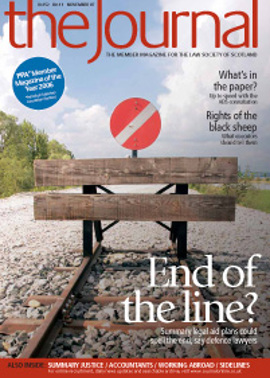Computer says no

The problems of the Child Support Agency are well known – including the expense and implementation issues associated with its computer system. According to statistics published in September, only 64% of children are currently receiving maintenance where it is due. £3.5 billion is outstanding, of which £1.9 billion is deemed “probably uncollectable”. The Child Maintenance and Other Payments Bill 2007 proposes a new start, replacing the CSA with the new Child Maintenance and Enforcement Commission, or “C-MEC”. Ignoring the fact that the acronym seems more suited to a Star Wars robot than a new public body, are the proposals anything more than a rehash of the old system?
Enforcement powers
This is one of the main thrusts of the bill. Proposed new powers include:
- collection of maintenance payments directly from the bank account of the non-resident parent (“NRP”);
- confiscation of the NRP’s passport;
- imposition of curfews;
- electronic tagging; and
- credit blacklisting.
It is questionable whether these new measures will prove any more useful in securing payment. The current problems stem less from the powers available to the CSA, than from its reluctance and delay in deploying them. However, a highly publicised enforcement campaign has been rolled out in certain cities, with a five-week blitz recently undertaken in Glasgow.
The maintenance formula
Schedule 4 sets out changes to the formula. Rather than the familiar percentage of the NRP’s net weekly income (15% for one child, 20% for two and 25% for three or more children), the proposals amend the basic rate to 12%, 16% and 19% respectively – but of gross income rather than net. The theory is that gross income is harder to manipulate. For any gross weekly income earned by the NRP in excess of £800, the percentages reduce to 9%, 12% and 15%. The starting gross income for the calculation is reduced by a percentage in respect of any children in the NRP’s new household (12%, 16% or 19% for one, two or three children respectively). This proposed formula seems, on the whole, to produce a slightly higher outcome for the parent with care (“PWC”).Care parents on benefit
PWC on benefit will be free to make private arrangements, rather than being forced to use C-MEC, repealing ss 6 and 46 of the Child Support Act 1991. At present it is compulsory for a PWC receiving benefits to use the CSA for maintenance arrangements. This proposal could be seen as a cynical attempt to relieve part of the administrative burden which has dogged the CSA since its inception. However, these private arrangements will be a welcome step for parents on low incomes who are nevertheless willing to pay for their children, as the PWC will no longer suffer a corresponding reduction in benefit.
PWC on benefit using C-MEC will keep more of their benefit – but not much more, and not yet. For post-March 2003 assessments, the current system allows PWC on benefit to retain £10 per week of any maintenance paid. This is to be extended to benefit cases still determined under the pre-2003 CSA rules. The 2006 report by Sir David Henshaw, upon which much of the bill is based, recommended allowing PWC on benefit to retain the bulk of any maintenance collected. This has not been followed, although it is proposed that the amount retained increase in 2010 or 2011.
What the bill doesn’t do
These reforms beg the fundamental question as to who is supposed to be the beneficiary – children, parents with care, or the Treasury? And is a more extensive overhaul required? The bill shies away from some of the more radical proposals in Sir David’s report, and also from proposals by the CSA committee of resolution (the English FLA). In particular:
- The “12 month rule” allowing a maintenance assessment to be made one year after signature of a minute of agreement (or English consent order) remains. Its abolition was favoured by Sir David and Resolution, to enhance predictability.
- The proposal that assessment be index-linked has been ignored.
- There is no allowance for PWC to take enforcement action themselves via the courts, as suggested by Resolution.
- There is no rectification of the gross anomalies which can occur, due to the inflexibility of the system, where care is equally shared between parents. In such cases, the parent in receipt of child benefit is deemed by the CSA to be the PWC, and so can apply for an assessment, even if he/she is the higher earner.
The bill is currently being considered by Parliament, and if passed as expected, will be in force post-2008. The alternative, of course, would be for the government to acknowledge that the whole system is a failure, and return all child maintenance to the jurisdiction of the courts…
Lucia Clark, solicitor, and Laura Birrell, trainee solicitor, Family Law Team, Morton Fraser LLP
In this issue
- The shape of your future
- The law and the forum
- End of the line?
- Summary justice: the big picture
- Now it's your turn
- Flying south
- Legal rights and the black sheep
- Mediation innovation
- Counting on your CA
- The risk of paper cuts
- Society hits the Net at Murrayfield
- Leading the charge
- Computer says no
- Who, what, where, when, why?
- Getting in on the Act
- Scottish Solicitors' Discipline Tribunal
- Website reviews
- Book reviews
- Well funded work
- PSG offers an offer






